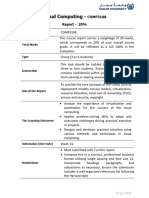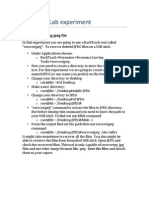Atllasian Product
Uploaded by
AkankshaAtllasian Product
Uploaded by
AkankshaHi, so today we will be discussing Security Flaw in Atlassian Products (Jira,
Confluence, Trello, BitBucket) Affecting Multiple Companies.
Recently on 6th Dec 2022, CloudSEK disclosed a cyber attack directed at the
company.During the course, the internal investigation team identified that the
threat actor also called a malicious actor or bad actor gained access to a CloudSEK
employee’s Jira account, using Jira session cookies present in stealer logs like
usernames and passwords or other sensitive informtion and then send this
information to another system either via email or over a network which is then
being sold on the darkweb.
Following further investigation, it was found that for Atlassian products like
Jira, Confluence, and BitBucket), cookies are exposed, even if the password is
changed, with (Two-factor Authentication) enabled, as the validation period of
cookie is 30 days,They only expire when the user logs out, or after 30 days of
interval. Hence, threat actors can restore Jira, Confluence, Trello, or BitBucket
sessions, using stolen cookies, even if they don’t have access to MFA OTP/ PIN.
This is a well-known problem, and since tokens are needed to use it and access
systems, most businesses do not see it as being under the purview of security
reporting. Other flaws, such as XSS(Cross-site Scripting), that can be leveraged to
get tokens fall under the purview of security reporting. In this instance, however,
social engineering is needed to exploit the virus and spill information like
cookies, which is outside the scope of Bug Bounty operations.
Threat actors or malicious actor may now easily obtain these tokens, however it is
still not that simple. Cookie theft is now frequent due to the increase in device
hack efforts, breaches/breakdowns, and password leaks. Additionally, cookies can be
purchased, and it's easy to discover a business, purchase its logs, and locate the
necessary tokens to obtain access to its internal systems.
Researchers from CloudSEK have found that this vulnerability allows for the
takeover of Jira accounts at hundreds of businesses. According to their data, there
are 16,201 Jira cookies for sale on dark web marketplaces, and there are over
1,282,859 compromised PCs. Additionally, approximately 2,937 hacked PCs and 246
Jira credentials were made public just in the past 30 days. They have detected at
least one infected machine from a Fortune 1000 organisation in the last ninety
days. This only takes into account their main websites i.e,their primary domain not
their affiliates or subsidiaries.
CloudSEK has also released a free tool that lets companies check if their
compromised computers and Jira accounts are being advertised on dark web
marketplaces.
In the case of Atlassian products, only one JSON web token (JWT) is required to
hijack a session i.e. cloud.session.token. Atlassian JWT tokens have the email
address embedded in the cookie. Hence, it is easy to determine which user the
cookie belongs to.This bug has been resolved by them few days before after this
issue came into the picture by cloudSEK. Atlassian added a redirect URL parameter
in the response to change the password request now. This will invalidate the
current session and will assign a new session token to the user.
More than 200 different atlassian.net-related credentials and cookies have been
listed for sale on dark web marketplaces in the past 30 days. It's very possible
that many of the credentials are still in use because they were listed for sale
just 30 days ago.
On doing the Anatomy of a Stealer-Log File, some of the victim’s information
included in the stealer log are:IP,Screenshots,Location,Language,Softwares
installed,Hardware configuration,Plain text credentials for websites
visited,Cookies from all browsers used by the victim,Cryptocurrency wallets
information,Saved Debit / Credit card details.
Generally, the stealer virus that is most often used for data collection and sale
on dark web markets is VIDAR (70.9%), Redline (24.2%), Racoon (4.9%).Also According
to an analysis of data from dark web markets, stealer virus most frequently
affected Windows OS users as victims. The United States, India, and Brazil are the
top 3 nations for which stealer logs contain data.
Some Prevention Techniques which can be taken into considerations are -
1.)Encourage staff to regularly log out of sensitive applications
2.)Until a solution is made available by Atlassian, you can configure a shorter
idle session for Atlassian products on the admin.atlassian.com website under the
Security Authentication rules area.
3.)To enable re-logins, implement an idle-session timeout.
4.)Examine the forums devoted to cybercrime for the newest threat actors'
strategies.
5.)Verify whether the data from your company is offered for sale on the dark web.
That's it from my side, hope this information helps you,
Talk soon bbyee.
You might also like
- What Men Dont Want Women To Know - The Secrets, The Lies, The Unspoken Truth - Smith and Doe90% (20)What Men Dont Want Women To Know - The Secrets, The Lies, The Unspoken Truth - Smith and Doe157 pages
- 7839+ Awesome Deep Web Onion Links List (Uncensored Content) PDF74% (35)7839+ Awesome Deep Web Onion Links List (Uncensored Content) PDF391 pages
- Darknet-Bible - Everything You Need To Know To Order Safely at Darknet Markets100% (3)Darknet-Bible - Everything You Need To Know To Order Safely at Darknet Markets218 pages
- Organizing Solutions For People With ADHD, 2nd Edition-Revised and Updated95% (58)Organizing Solutions For People With ADHD, 2nd Edition-Revised and Updated221 pages
- Sunbeam Popcorn Maker FPSBPP7310 FPSBPP731660% (10)Sunbeam Popcorn Maker FPSBPP7310 FPSBPP73169 pages
- 180 Degrees Unlearn The Lies Youve Been Taught To Believe 1nbsped 9781915236005100% (2)180 Degrees Unlearn The Lies Youve Been Taught To Believe 1nbsped 9781915236005769 pages
- 30 Best Tor Sites For Any and Everything You'll Ever Need! - Your Hacker90% (29)30 Best Tor Sites For Any and Everything You'll Ever Need! - Your Hacker8 pages
- (Aspen Coursebook Series) Amy E. Sloan - Basic Legal Research - Tools and Strategies-Wolters Kluwer (2019)100% (9)(Aspen Coursebook Series) Amy E. Sloan - Basic Legal Research - Tools and Strategies-Wolters Kluwer (2019)338 pages
- Show Your Work! - 10 Ways To Share Your Creativity and Get Discovered (PDFDrive)100% (15)Show Your Work! - 10 Ways To Share Your Creativity and Get Discovered (PDFDrive)142 pages
- Side Hustle Bible (James Altucher) (Z-Library)100% (3)Side Hustle Bible (James Altucher) (Z-Library)197 pages
- 7839+ Awesome Deep Web Onion Links List (Uncensored Content)50% (4)7839+ Awesome Deep Web Onion Links List (Uncensored Content)54 pages
- Hidden Wiki Updated Deep Web Link List 2020 - Now Accessible On Clearnet - Please Use Tor Browser For Good Opsec - Http://hiddenwkiikyit5r.onion - Pet100% (4)Hidden Wiki Updated Deep Web Link List 2020 - Now Accessible On Clearnet - Please Use Tor Browser For Good Opsec - Http://hiddenwkiikyit5r.onion - Pet24 pages
- Unfuck Your Worth Workbook - Manage Your Money, Value Your Own Labor, and Stop Financial80% (5)Unfuck Your Worth Workbook - Manage Your Money, Value Your Own Labor, and Stop Financial160 pages
- The Art of Invisibility - The World's Most Famous Hacker Teaches You How To Be Safe in The Age of Big Brother and Big Data - PDF Room100% (2)The Art of Invisibility - The World's Most Famous Hacker Teaches You How To Be Safe in The Age of Big Brother and Big Data - PDF Room252 pages
- Extreme Privacy What It Takes To Disappear100% (4)Extreme Privacy What It Takes To Disappear640 pages
- Guide To Law Enforcement Mobile Phone Investigations100% (10)Guide To Law Enforcement Mobile Phone Investigations12 pages
- Chapter 12 - Behavioral Finance and Technical AnalysisNo ratings yetChapter 12 - Behavioral Finance and Technical Analysis8 pages
- Please DocuSign Independent Contractor AgreeNo ratings yetPlease DocuSign Independent Contractor Agree9 pages
- Research Report On Tata Motors Limited PDFNo ratings yetResearch Report On Tata Motors Limited PDF16 pages
- 10 Useful Websites You Wish You Knew Earlier! 6 (2017)0% (1)10 Useful Websites You Wish You Knew Earlier! 6 (2017)21 pages
- Side Hustle Bible - Ways To Make Money Without A Job82% (11)Side Hustle Bible - Ways To Make Money Without A Job23 pages
- Top 150 Books For Startup Founders and Entrepreneurs94% (33)Top 150 Books For Startup Founders and Entrepreneurs4 pages
- How To Build A Shopify Store The Right Way100% (3)How To Build A Shopify Store The Right Way37 pages
- E158 - How To Tame Your Inner Critic, With Psychologist Ethan Kross0% (1)E158 - How To Tame Your Inner Critic, With Psychologist Ethan Kross12 pages
- Step by Step Dark Web Guide 2024 Free E Book 1100% (1)Step by Step Dark Web Guide 2024 Free E Book 112 pages
- Weaponization Committee: HOW A "CYBERSECURITY" AGENCY COLLUDED WITH BIG TECH AND "DISINFORMATION" PARTNERS TO CENSOR AMERICANS100% (3)Weaponization Committee: HOW A "CYBERSECURITY" AGENCY COLLUDED WITH BIG TECH AND "DISINFORMATION" PARTNERS TO CENSOR AMERICANS37 pages
- Essential Underground Handbook P M L Publishing100% (1)Essential Underground Handbook P M L Publishing229 pages
- 1-JDBC Transaction-02-08-2022 (02-Aug-2022) Material - I - 02-08-2022 - CSI3018 - Module1No ratings yet1-JDBC Transaction-02-08-2022 (02-Aug-2022) Material - I - 02-08-2022 - CSI3018 - Module136 pages
- Hashmap - Word Counter Application: Public Class Wordfrequency Implements Comparable (No ratings yetHashmap - Word Counter Application: Public Class Wordfrequency Implements Comparable (4 pages
- WP Qlik Sense Enterprise Saas Technical Overview enNo ratings yetWP Qlik Sense Enterprise Saas Technical Overview en33 pages
- Sme (Windows & Vmware) / Project Lead: Experience SkillsNo ratings yetSme (Windows & Vmware) / Project Lead: Experience Skills5 pages
- SAP Analytics Cloud - How To Create and Connect A R Visualization To A SAC ModelNo ratings yetSAP Analytics Cloud - How To Create and Connect A R Visualization To A SAC Model13 pages
- 3. Database Development Lifecycle (Dbdlc)No ratings yet3. Database Development Lifecycle (Dbdlc)45 pages
- Language Design and Overview of COOL: Instructor: Fredrik Kjolstad Slides Based On Slides Designed by Prof. Alex AikenNo ratings yetLanguage Design and Overview of COOL: Instructor: Fredrik Kjolstad Slides Based On Slides Designed by Prof. Alex Aiken26 pages
- VERITAS Cluster Server Enterprise Agent 4.1 For Oracle: Installation and Configuration GuideNo ratings yetVERITAS Cluster Server Enterprise Agent 4.1 For Oracle: Installation and Configuration Guide112 pages
- Windows Server 2008 Exam Practice (Mod-II) - SET-CNo ratings yetWindows Server 2008 Exam Practice (Mod-II) - SET-C3 pages
- Forensics Lab Experiment: Task1 - Recovering Jpeg FileNo ratings yetForensics Lab Experiment: Task1 - Recovering Jpeg File5 pages
- SQL For Beginners Tutorial (Learn SQL in 2020) - DatagyNo ratings yetSQL For Beginners Tutorial (Learn SQL in 2020) - Datagy27 pages
- A Review On Data Warehouse Management PDFNo ratings yetA Review On Data Warehouse Management PDF5 pages























































































































